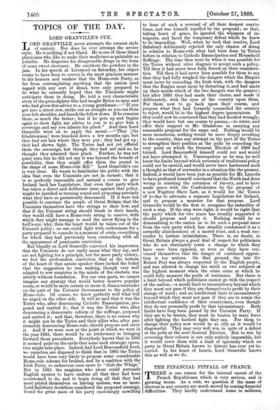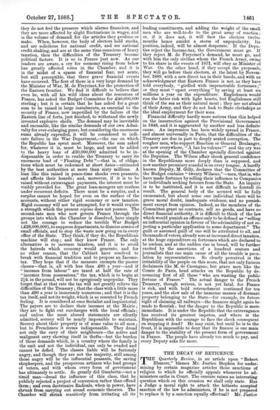THE FINANCIAL PITFALL OF FRANCE. T HERE is one reason for
the internal unrest of the French Republicans which is very serious, and is growing worse. As a rule, we question if the mass of electors in any country are much moved by coming financial difficulties. They hardly understand sums in millions, they do not feel the pressure which alarms financiers, and they axe more affected by slight fluctuations in wages, and in the volume of demand for the articles they produce or make. When, however, the body of electors hold stocks, and are solicitous for national credit, and see national credit shaking, and are at the same time conscious of heavy taxation, then the difficulties of the Treasury become political factors. It is so in France just now. As our readers are aware, a cry for economy rising from below has greatly affected votes in the Chamber, and it is in the midst of a spasm of financial fear, not acute, but still perceptible, that three grave financial events have occunecL The first of these is a very large demand by the Minister of War, M. de Freycinet, for the protection of the Eastern frontier. We find it difficult to believe that even he, with all his wild ideas about the resources of France, has asked the Budget Committee for £40,000,000 sterling ; but it is certain that he has asked for a great sum to be raised in large instalments, as essential to the security of France, now imperilled by the failure of the Eastern line of forts, just finished, to withstand the newly invented explosive shells. The demand may be inevitable and excusable, like the similar demands of our own Admi- ralty for ever-enlarging guns; but considering the enormous sums already expended, it will be considered to indi- cate failure in the War Department,—the one on which the Republic has spent most. Moreover, the sum asked for, whatever it is, must be large, and must be added to the heavy loan of £30,000,000 admitted to be in- dispensable in order to enable the Treasury to carry its enormous load of "Floating Debt "—that is, of obliga- tions which must be redeemed at short dates—estimated by the best authorities at more than sixty millions. A loan like this raised in peace-time shocks even peasants, and affects their hoards ; and, moreover, if it is to be raised without extravagant payments, the interest must be visibly provided for. The great loan-mongers are restless under recurrent deficits. There must be a surplus, and a surplus cannot be hoped for even on the surface of the accounts, without either rigid economy or new taxation. Rigid economy will not be attempted, for it would require a strength which the present rggime does not possess. The second-rate men who now govern France through the groups into which the Chamber is dissolved, have simply not the courage to reduce the terrible War Budget (228,000,000), to suppress departments, to dismiss armies of small officials, and to stop the waste now going on in every office of the State. They think, if they do, the Republican machine will stop ; and they know France. The only alternative is to increase taxation, and it is to avoid the hatreds which economy would generate, and for no other reason, that the Cabinet have resolved to break with financial tradition and to propose an Income- tax. They hope that if the measure exempts the poorer classes—that is, all with less than £80 a year—and if "incomes from labour" are taxed at half the rate of "incomes from possessions," the tax, which is to begin at 4d. in the pound, will not be egregiously unpopular. They forget that at that rate the tax will not greatly relieve the difficulties of the Treasury; that the class with a little more than £80 a year is immensely numerous ; and that it is the tax itself, and not its weight, which is so resented by French feeling. It is considered at once Socialist and inquisitorial. The payers are to declare their incomes at the Maine; they are to fight out surcharges with the local officials ; and unless the most absurd statements are silently admitted, secrecy will be nearly impossible to maintain. Secrecy about their property is of some value to all men ; but to Frenchmen it seems indispensable. They dread • not only the envy of their neighbours—the active and malignant envy showing itself in thefts—but the burden of those demands which, in a country where the family is the unit and not the individual, can only be evaded and cannot be defied. The classes liable will be furiously angry, and though they are not the majority, still among those angry will be the influential peasants, the saving shopkeepers, and the prosperous artisans who lead groups of voters, and with whom every form of government has ultimately to settle. So greatly did Gambetta—not a timid man—dread the influence of this class, that he publicly rejected a project of conversion rather than offend them ; and even doctrinaire Radicals, when in power, have shrunk from carrying out sound economic theories. The Chamber will shrink sensitively from irritating all its leading constituents, and. adding the weight of the small men who are well-to-do to the great army of reaction ; or, if it does not, it will face the electors twelve months hence amidst a storm of unpopularity. Its position, indeed, will be almost desperate. If the Depu- ties reject the Income-tax, the Government must go. If they reject M. de Freycinet's demand, he must go, and with him the only civilian whom the French Army, owing to his share in the events of 1871, will obey as Minister of War. On the other hand, if they accept the proposals, they will go before their electors, at the latest by Novem- ber, 1889, with a new direct tax in their hands, and with an acknowledgment that Eastern France is not, as they have told everybody, "girdled with impenetrable fortresses ;" or they must "upset everything" by saving at least six millions a year on the expenditure. Englishmen would run the latter risk with light hearts, but Englishmen still think of the sea as their natural moat ; they are not afraid of their Army, and they do not look to State clerkships as the ideal employment for their sons.
Financial difficulty hardly more serious than this helped on the insurrection against the Provisional Government in 1848, and it is aggravated by another and less definite cause. An impression has been widely spread in France,. and almost universally in Paris, that the difficulties of the Treasury are due in part to deeply seated corruption. The rougher men, who support Reaction or General Boulanger,. cry now everywhere, "A has les voleurs !" and the cry was at the opening of the Chamber specially directed against the Deputies. The Wilson affair shook general confidence in the Republicans more deeply than is supposed, and now another pecuniary scandal is on every tongue. A hardly known Deputy, M. Gully, declares that the Committee of the Budget contains "twenty Wilsons,"—men, that is, who have made fortunes by selling their influence to Companies or individuals seeking favours from the State. An inquiry is to be instituted, and it is not difficult to foretell its result. The general body of the accused will be fully exonerated, but about some one individual there will be grave moral doubt, inadequate evidence, and no punish- ment except from opinion. Indeed, as the members of the- Committee grant no contracts, sell no goods, and have no direct financial authority, it is difficult to think of the law which would punish an offence only to be defined as "selling an influential opinion in favour of the advisability of not re- jecting a particular application to some department." The guilt or assumed guilt of one will be attributed to all, and thousands of voters, already sore at increased direct taxation,, at the huge expenditure on fortresses which are declared to be useless, and at the sudden rise in bread, will be further excited by the assertions of a hundred orators and journalists that one main cause of all the trouble is pecu- lation by representatives. So clearly perceived is the irritability of the people on this score, that not only furious declaimers like M. de Cassagnac, but grave men like the Comte de Paris, head attacks on the Republic by de- nouncing first of all those "who are wasting the public fortune of France." The actual danger to the French Treasury, though serious, is not yet fatal, for France is rich, and with bold retrenchment continued for ten years, and the slow sale of the immense masses of dormant property belonging to the State—for example, its future- right of claiming all railways—the finances might again be- made to flourish ; but the danger to the Republic is more- immediate. It is under the Republic that the extravagance has received its greatest impetus, and where is the Republican with the courage to face the shock consequent on stopping it dead? He may exist, but until he is to the front, it is impossible to deny that its finance is one main danger to the stability of the present form of government in France. The people have already too much to pay, and every Deputy asks for more.







































 Previous page
Previous page